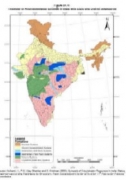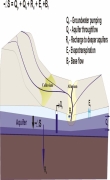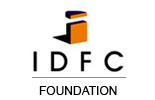Water Management
Water resources - Mid-term appraisal of the eleventh five year plan - Report by the Planning Commission
Posted on 25 Sep, 2010 04:57 PM The Eleventh Plan (2007-08 to 2011-12) sought to build on the gains achieved in the Tenth Plan and shift the economy to a path of faster and more inclusive growth. The Mid Term Appraisal (MTA) report for the Eleventh Five Year Plan 2007-2012 by the Planning Commission reviews the experience in the first three years of the Plan and seeks to identify areas where corrective steps may be needed.
The Eleventh Plan (2007-08 to 2011-12) sought to build on the gains achieved in the Tenth Plan and shift the economy to a path of faster and more inclusive growth. The Mid Term Appraisal (MTA) report for the Eleventh Five Year Plan 2007-2012 by the Planning Commission reviews the experience in the first three years of the Plan and seeks to identify areas where corrective steps may be needed.
The Eleventh Plan recognises the special challenges of water resources management facing India and the likelihood that these will grow over time due to the rising population and industrialisation.
This chapter discusses the major features of the water problem facing the country followed by a review of the performance of the schemes dealing with water in the Eleventh Plan. The chapter also proposes an alternative approach to be elaborated into an operational strategy to be implemented in the Twelfth Five Year Plan.
Processes that shape the earth: Part I – A presentation by ACWADAM
Posted on 24 Sep, 2010 07:04 PMThis presentation by ACWADAM on processes that shape the earth attempts to understand the irregularities of the surface of earth so as to consider the movement of groundwater. The earth’s surface is dotted with what is commonly perceived as high grounds or ‘hills’ and the low grounds or ‘valleys’. Hills and valleys result from movements in the earth and the long term processes of breaking-down the earth surface at some places and building it up at others, also called as diastrophism.
Urban development - Mid-term appraisal of the eleventh five year plan - Report by the Planning Commission
Posted on 22 Sep, 2010 08:02 PMThe Eleventh Plan (2007-08 to 2011-12) sought to build on the gains achieved in the Tenth Plan and shift the economy to a path of faster and more inclusive growth. The Mid Term Appraisal (MTA) report for the Eleventh Five Year Plan 2007-2012 by the Planning Commission reviews the experience in the first three years of the Plan and seeks to identify areas where corrective steps may be needed.
Rural development - Mid-term appraisal of the eleventh five year plan - Report by the Planning Commission
Posted on 22 Sep, 2010 06:16 PMThe Eleventh Plan (2007-08 to 2011-12) sought to build on the gains achieved in the Tenth Plan and shift the economy to a path of faster and more inclusive growth. The Mid Term Appraisal (MTA) report for the Eleventh Five Year Plan 2007-2012 by the Planning Commission reviews the experience in the first three years of the Plan and seeks to identify areas where corrective steps may be needed.
TheWater Channel news flash - Video contest
Posted on 22 Sep, 2010 10:34 AM
We are proud to announce the video contest "Water, Climate and.....Action!"
Water, Climate and…..Action! Enter your short film in the contest!
Integrated Data Management Systems using Geographic Information Systems – A presentation by ACWADAM
Posted on 21 Sep, 2010 11:25 PMThis presentation by ACWADAM deals with integrated data management using Geographic Information Systems. A Geographic Information System (GIS) integrates hardware, software, and data for capturing, managing, analyzing, and displaying all forms of geographically referenced information.
Groundwater balance – A presentation by ACWADAM
Posted on 21 Sep, 2010 10:00 PM This presentation by ACWADAM deals with the subject of groundwater balance. It begins by describing the skeleton for the water balance equation viz., ground surface, soil, aquifer and bed rock. It describes the processes subsequent to rainfall such as interception, initial detention, depression storage, infiltration, runoff, streamflow, soil moisture retention and recharge.
This presentation by ACWADAM deals with the subject of groundwater balance. It begins by describing the skeleton for the water balance equation viz., ground surface, soil, aquifer and bed rock. It describes the processes subsequent to rainfall such as interception, initial detention, depression storage, infiltration, runoff, streamflow, soil moisture retention and recharge.
The watershed water balance equation is explained in terms of input (rainfall and water transfers) and output (runoff, evapotranspiration and infiltration). It notes that the input to a generalized water balance is rainfall whereas the input to a groundwater balance is infiltration. The difference between infiltration & recharge, natural & artificial recharge and interflow & discharge are explained thereafter. The water balance for an aquifer may vary, depending upon the nature of groundwater system –
- Watershed with a deep aquifer
- Watershed has both shallow and deep aquifers
- Watershed has only shallow aquifer
India Infrastructure Report 2011 on Water - Call for papers
Posted on 21 Sep, 2010 02:22 PM Papers may address one or more of the following areas:
Papers may address one or more of the following areas:
Situation analysis
- Studies assessing current and future water situation in India
- Water – climate change nexus and implications for the future
Groundwater management: Conceptual framework – A presentation by ACWADAM
Posted on 20 Sep, 2010 08:36 PMThis presentation by ACWADAM deals with the conceptual framework of groundwater management.
Groundwater management under the climate change scenario in India – A presentation by ACWADAM
Posted on 20 Sep, 2010 08:17 AMThis presentation by ACWADAM deals with the issue of groundwater management under the climate change scenario in India. Climate change is a change in the statistical distribution of weather over periods of time that range from decades to millions of years. The causes are -variations in solar radiations, plate tectonics, volcanism and change in earths orbit & axis.







